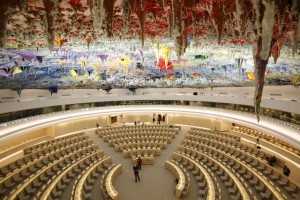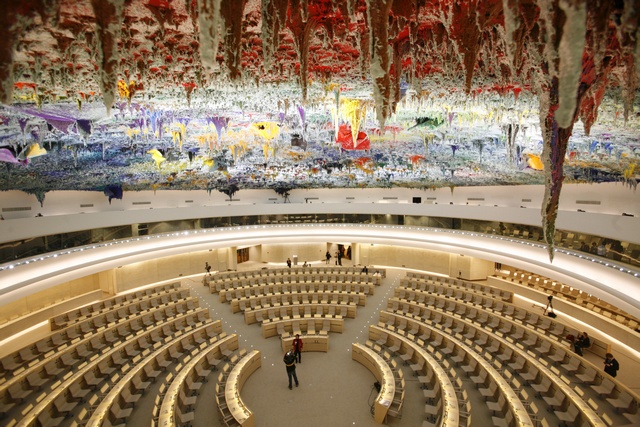
© 2008 Reuters
Today, 12 September, the UN Human Rights Council (HRC) inaugurates its 18th session in its Geneva headquarters, which is scheduled to continue until 30 September.
This session is of particular importance for the Arab region as regional issues occupy much of the session’s agenda. The session opens amidst a context of large-scale protests in various Arab countries whether where the people continue to resist their despotic governments in Syria, Bahrain, and Yemen, or where primary steps have been already taken on road to democracy as is the case in Egypt, Tunisia, and Libya.
NGOs play a pivotal role in the HRC through shedding light on the human rights situation in various countries while confronting governments with their violations of these rights. The Council thus permits these organizations to present records and assessments of the human rights situation through a system of written and oral interventions. The Cairo Institute for Human Rights Studies (CIHRS) is one of the non-governmental organizations holding consultative status with the UN Economic and Social Council, which allows it to submit such interventions.
CIHRS, in cooperation with other Arab organizations, has thus submitted four written interventions that address the human rights situation in Yemen, Tunisia, Syria, and Bahrain, in addition to a fifth intervention on the crisis of Egyptian NGOs and the smear campaign launched against them by the Egyptian authorities, labeling them as foreign agents and accusing them of treason. Additionally, CIHRS submitted two written interventions on Sudan, one participating in the Universal Periodic Review of Sudan, urging the government of Sudan to accept recommendations that came out of the Review, while the other urges that the mandate of the UN Independent Expert on Sudan be renewed.
Of the oral interventions scheduled by CIHRS, the most significant are interventions on the Universal Periodic Reviews of Libya and Sudan. CIHRS is also presenting oral interventions on the report of the UN fact-finding mission in Libya and on the status of affairs in the occupied Palestinian territories, stressing the need to support the Palestinian demand for statehood, to be submitted to the UN Security Council. In addition to this, another oral intervention on the reports of the UN Office of the High Commissioner for Human Rights on the situation in Syria and Yemen shall be presented.
On the sidelines of the session, several side events and meetings are scheduled, four of which are being organized by CIHRS. The first side event will be convened on Monday afternoon, 12 September, on the course of the revolution in Egypt in light of recent developments and the future of parliamentary elections. The other seminars include an event on the situation in Bahrain, which will screen a documentary film explaining developments in the country, and another one on alleged Crimes Against Humanity committed in Syria, Yemen, and Libya. CIHRS is also organizing an event to discuss the human rights situation in Sudan after secession.
In a rare occurrence, the HRC convenes a panel on the promotion and protection of human rights in the context of peaceful protests, to be held on Tuesday, 13 September. Bahey eldin Hassan, the director of CIHRS, will speak on the nature of these violations in Arab countries like Syria, Libya, Bahrain, Yemen, Egypt, and Tunisia witnessing broad-based protests.
The Human Rights Council is the principal UN organ to address human rights issues. It is composed of 47 member states and holds three regular sessions every year, the first being on 19 June 2006.
Share this Post

